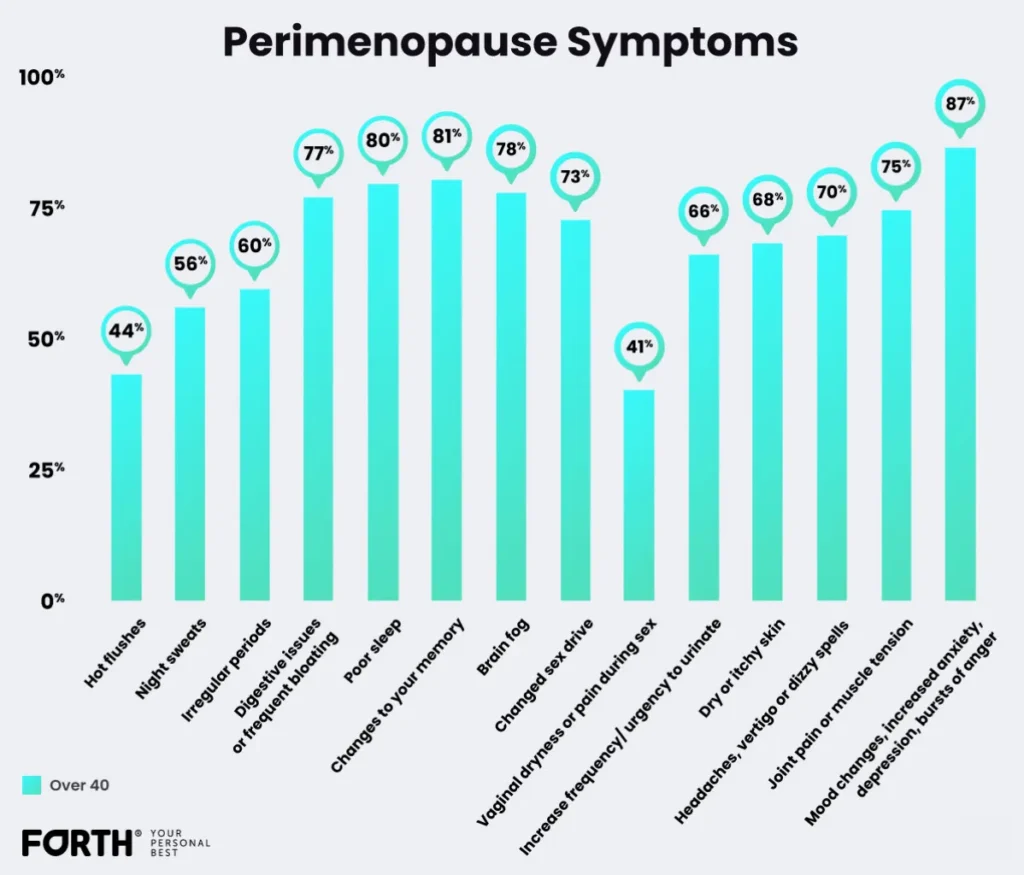Perimenopause is a natural stage in a woman’s life that typically occurs in her 40s or early 50s. It is the period leading up to menopause, when the ovaries gradually begin to produce less estrogen. This hormonal shift can lead to a wide range of symptoms that can vary in severity from woman to woman. In this article, we will explore the top 10 most common perimenopause symptoms and provide tips on how to manage them effectively.
One of the hallmark signs of perimenopause is irregular periods. This can include changes in the frequency, duration, and intensity of menstrual cycles. Some women may experience heavier or lighter periods, while others may have unpredictable spotting or missed periods altogether. To manage irregular periods, it is important to track your cycle and speak with your healthcare provider about potential treatment options, such as hormone therapy or birth control.
2. Hot Flashes
Hot flashes are another common symptom of perimenopause, characterized by sudden feelings of intense warmth that can spread throughout the body. This can be accompanied by sweating, flushing, and rapid heartbeat. To manage hot flashes, try to identify and avoid triggers such as spicy foods, caffeine, alcohol, and stress. Dress in layers to easily remove clothing when a hot flash occurs, and consider hormone therapy or other medications for severe symptoms.
3. Night Sweats
Night sweats are similar to hot flashes but occur during sleep, leading to excessive sweating that can disrupt your rest. To manage night sweats, try sleeping in a cool room with breathable bedding, such as cotton sheets and lightweight pajamas. Avoid caffeine and alcohol before bed, and practice relaxation techniques to reduce stress and promote better sleep.
4. Mood Swings
Hormonal fluctuations during perimenopause can also affect your mood, leading to mood swings, irritability, anxiety, and depression. To manage mood swings, prioritize self-care activities such as exercise, meditation, and socializing with friends and family. Consider therapy or counseling to address underlying emotional issues, and speak with your healthcare provider about potential medication options.
5. Fatigue
Many women experience increased fatigue and low energy levels during perimenopause, which can be exacerbated by poor sleep and hormonal imbalances. To manage fatigue, prioritize a healthy diet rich in fruits, vegetables, whole grains, and lean proteins. Stay hydrated, exercise regularly, and practice good sleep hygiene to improve your energy levels and overall well-being.
6. Weight Gain
Weight gain is a common symptom of perimenopause, particularly around the abdomen and hips. This can be attributed to hormonal changes, decreased metabolism, and lifestyle factors such as poor diet and lack of exercise. To manage weight gain, focus on maintaining a balanced diet and regular exercise routine. Consider working with a nutritionist or personal trainer to develop a customized plan that meets your individual needs and goals.
7. Insomnia
Insomnia is another common symptom of perimenopause, characterized by difficulty falling asleep, staying asleep, or waking up too early. To manage insomnia, establish a consistent bedtime routine and sleep schedule. Create a relaxing sleep environment free of distractions, such as electronics and bright lights. Limit caffeine and alcohol intake before bed, and consider relaxation techniques such as deep breathing, meditation, or gentle yoga.
8. Brain Fog
Many women experience cognitive changes during perimenopause, such as forgetfulness, difficulty concentrating, and mental fogginess. This can be attributed to hormonal fluctuations, sleep disturbances, and stress. To manage brain fog, practice mental exercises such as puzzles, memory games, and reading. Stay organized with to-do lists and calendars, and prioritize self-care activities that promote mental clarity, such as exercise, healthy eating, and stress management.
Vaginal dryness is a common symptom of perimenopause, characterized by a lack of lubrication and discomfort during sexual activity. This can be attributed to decreased estrogen levels, which can lead to thinning and inflammation of the vaginal tissues. To manage vaginal dryness, consider using water-based lubricants or vaginal moisturizers to alleviate discomfort and improve sexual satisfaction. Speak with your healthcare provider about hormone therapy or other treatment options for severe symptoms.
10. Loss of Libido
Many women experience a decreased interest in sex during perimenopause, which can be attributed to hormonal changes, physical discomfort, and emotional factors. To manage loss of libido, prioritize open communication with your partner about your needs and desires. Explore new ways to connect and enhance intimacy, such as sensual massage, romantic gestures, and quality time together. Consider therapy or counseling to address underlying issues and improve your sexual health and well-being.
FAQs:
Q: How long does perimenopause last?
A: Perimenopause typically lasts for several years, with the average duration ranging from 4 to 8 years. However, the length of perimenopause can vary from woman to woman, with some experiencing symptoms for a shorter or longer period of time.
Q: Can I still get pregnant during perimenopause?
A: Yes, it is still possible to get pregnant during perimenopause, as ovulation can occur irregularly. It is important to use contraception if you do not wish to become pregnant, even if your periods are irregular or have stopped altogether.
Q: When should I see a healthcare provider about my perimenopause symptoms?
A: If you are experiencing severe or persistent symptoms that are impacting your quality of life, it is important to speak with your healthcare provider. They can help identify the underlying causes of your symptoms and recommend appropriate treatment options to manage them effectively.
Q: Are there natural remedies for perimenopause symptoms?
A: There are several natural remedies that can help alleviate perimenopause symptoms, such as herbal supplements, acupuncture, and dietary changes. However, it is important to consult with a healthcare provider before trying any new treatments to ensure they are safe and effective for your individual needs.
In conclusion, perimenopause is a natural stage in a woman’s life that can be accompanied by a wide range of symptoms. By understanding the most common perimenopause symptoms and how to manage them effectively, you can navigate this transitional period with grace and confidence. Prioritize self-care, seek support from healthcare providers and loved ones, and remember that you are not alone in this journey. Embrace this new chapter in your life with resilience and optimism, knowing that brighter days are ahead.


